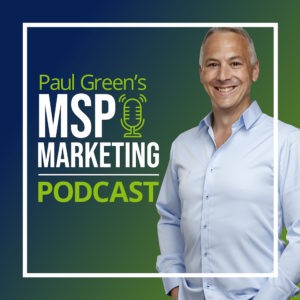
The podcast powered by the MSP Marketing Edge
Welcome to episode 247 of the MSP Marketing Podcast with me, Paul Green. This is THE show if you want to grow your MSP.
In this episode I share how successful MSP owners debunk the 60-hour work week myth, proving that working around 30 hours per week promotes better health, stronger relationships, and strategic business growth. (jump to)
I also discuss why taking a proper break to reflect on key strategic questions can provide clarity and focus, enabling you to achieve your business goals for the rest of 2024. (jump to)
My guest this week, Jane Matthews of Wildcat Careers, highlights the importance of strong employee branding for MSPs, emphasising that a well-crafted employee value proposition is key to attracting and retaining top tech talent. (jump to)
Lastly, I answer a question from Chris who runs an MSP in the south of England. He wants to know how to reward a high performing team member so they feel appreciated. Personalised rewards that are tailored to employees’ interests and needs are often more impactful than cash bonuses, enhancing motivation and loyalty. (jump to)
Join me as we unpack these topics and learn from some triumphs and trials in the MSP world. Oh, and don’t forget to join me in the MSP Marketing Facebook group.
The 60 hour work myth kills MSPs

If you’re ending your work week exhausted, barely able to crack open a beer and stare at the TV, it’s time for a change. This relentless pace isn’t sustainable. Contrary to popular belief, the most successful MSP owners don’t work 60-hour weeks. In fact, they work significantly less.
The 60-hour myth suggests that to be a successful business owner, one must work these gruelling hours indefinitely. While it’s true that the early stages of starting a business often require extra hours, this should not be a permanent state.
Starting your MSP is exhilarating. You’re taking control of your income, your time, and the type of work you do. In the beginning, putting in 60 hours a week might be necessary and even enjoyable. However, when this habit extends into years, it becomes detrimental. Many MSPs, even with million-dollar turnovers, continue to grind out these hours, believing it’s the hallmark of success. It’s not.
Successful business owners actually work around 30 hours a week. Constantly working 60-hour weeks poses significant risks to your health, your family life and your relationships with loved ones. Additionally, overworking negatively impacts your staff, clients, and the business itself. It stifles strategic thinking and decision-making, which require time and mental space.
Shifting to a 30-hour work week allows you to make more thoughtful decisions, delegate effectively, and focus on growth. Successful MSP owners I’ve interviewed consistently work fewer hours and achieve more. Embracing this approach will help you work smarter, not harder, and drive your business forward.
3 simple questions to max out the rest of 2024

A proper break allows you to escape the minutiae that gradually wear you down, giving your mind the space to ponder strategic questions. During your time off, consider these three pivotal questions:
- What do you want more than anything else from your MSP in the rest of 2024?
- To achieve that, what must you do less of?
- And lastly, what must you do more of?
These questions are simple but profoundly powerful. Reflect on them every few months to gain clarity on your goals and the steps to achieve them. Once your break ends and you return to the office, don’t just let these insights gather dust. Spend your first 48 hours back clearing up clutter and catching up. Then, shift your focus to implementing the actions necessary to grow your business.
With the right focus and dedication, no matter how ambitious your goals are for the rest of the year, you can achieve them. Remember, clarity and action are your best allies.
Why techs don’t want to work for you – and how to fix that
 I’m joined by Jane Matthews, the Managing Director of Wildcat Careers, an award-winning specialist in MSP technical recruitment.
I’m joined by Jane Matthews, the Managing Director of Wildcat Careers, an award-winning specialist in MSP technical recruitment.
Jane enlightens us on the crucial concept of employee branding and its profound impact on attracting and retaining top tech talent. She explains that a strong employee value proposition (EVP) encompasses compensation, work-life balance, job stability, location, and respect within the company culture.
Jane emphasises that MSPs, especially smaller ones, must effectively market themselves to prospective employees. This involves showcasing their unique values and benefits through career sites and social media, creating an appealing narrative about the work environment.
The recruitment process is akin to marketing – it’s about selling the company’s culture and benefits to attract not only active job seekers but also passive talent. In today’s competitive market, flexibility, personal development opportunities, and health insurance are key elements tech professionals seek.
Jane’s insights provide a comprehensive checklist for MSPs to enhance their employee branding and, consequently, their recruitment success. For those struggling to navigate these waters, partnering with knowledgeable recruiters can be a game-changer.

FEATURED GUEST:
Jane Matthews, the Managing Director of Wildcat Careers, a leading specialist in MSP technical recruitment and career consultancy.
Under Jane’s leadership, Wildcat Careers has achieved remarkable success, winning several prestigious awards over the last two and a half years, including the title of Best IT and Cyber Recruitment Firm 2024.
Jane brings a wealth of knowledge and experience in helping MSPs build high-performing teams through strategic recruitment solutions.
Connect with Jane on LinkedIn and check out Wildcat Careers website.
How to effectively reward a high-performing team member
Chris who runs an MSP in the south of England wants to know how to effectively reward a high-performing team member whose performance has started to dip.
While cash bonuses are a straightforward option, they often lack long-term impact. Instead, consider more personalised rewards.
For example, in a previous role, I gifted a luxury bottle of vodka to a young writer who appreciated it but later switched to home-goods gift cards as her needs changed.
Another creative example came from a business owner who rewarded a Formula One fan with Grand Prix tickets, resulting in the employee’s best performance yet.
Personalised rewards not only show genuine appreciation but also strengthen employee loyalty and motivation. The key is to make the reward memorable and meaningful, making your team members feel truly valued and understood.
Got a question about your MSP’s marketing? Submit one here for Paul’s Personal Peer Group.
